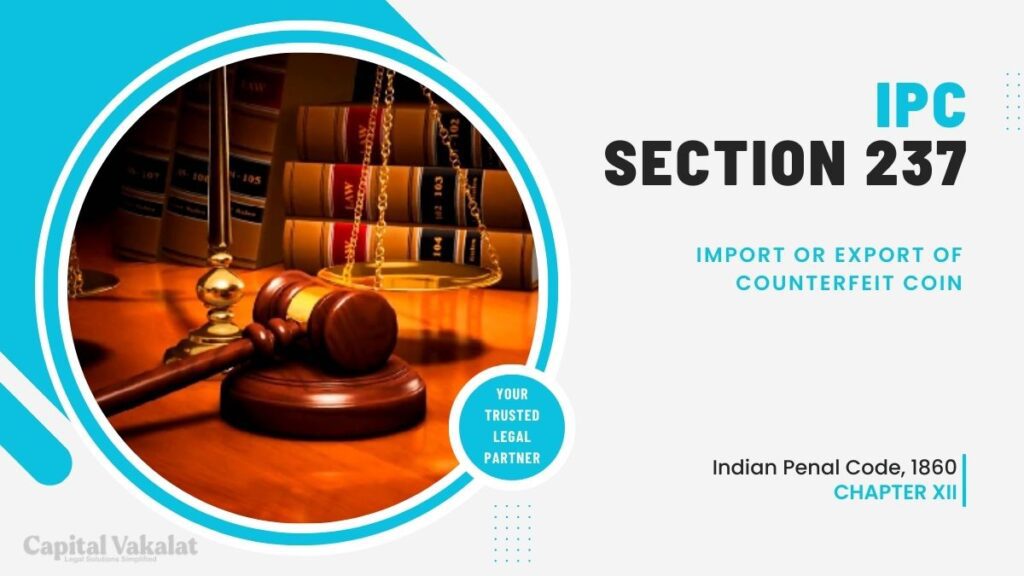Counterfeit coins have long been a concern for both governments and individuals. In India, Section 237 of the Indian Penal Code (IPC) addresses the issue of importing or exporting counterfeit coins. This legal provision is essential for maintaining the integrity of the country’s currency and preventing fraudulent activities. In this comprehensive article, we will delve into the details of Section 237 IPC, exploring its significance, provisions, penalties, and its broader implications.

Counterfeiting coins is a crime that undermines the stability and trust in a nation’s currency system. Section 237 of the Indian Penal Code (IPC) deals with the import or export of counterfeit coins, aiming to curb this illicit practice. In this article, we will explore the intricacies of this legal provision, its significance in maintaining financial integrity, and the consequences of violating it.
Understanding Section 237 IPC
Section 237 of the IPC pertains to the import or export of counterfeit coins. It serves as a deterrent to those who attempt to introduce fake currency into the market or export it to other nations. This section is critical to maintaining the sanctity of the country’s financial system, preventing the erosion of public trust in currency, and ensuring the smooth functioning of economic transactions.
The Significance of Counterfeit Coin Offenses
Counterfeit coin offenses not only harm the economy but also affect the common man. When counterfeit coins enter circulation, they devalue genuine currency and disrupt the financial system. Citizens, businesses, and the government can suffer significant losses due to this illegal activity. Therefore, Section 237 IPC plays a crucial role in safeguarding the interests of all stakeholders.
Provisions of Section 237 IPC
Section 237 IPC explicitly states that anyone who imports or exports counterfeit coins, knowing them to be counterfeit, is liable for prosecution. It covers all aspects of importing or exporting such coins, making it a comprehensive legal provision to combat counterfeit currency-related offenses.
Penalties for Violating Section 237 IPC
Violating Section 237 IPC is a serious offense. Those found guilty can face stringent penalties, including imprisonment. The severity of the punishment depends on various factors, such as the scale of the offense, the involvement of organized crime, and the impact on the economy.
The Legal Process and Evidence
To convict someone under Section 237 IPC, the legal process involves gathering substantial evidence to prove that the accused knowingly imported or exported counterfeit coins. This requires a thorough investigation and presentation of compelling proof in a court of law.
Preventive Measures
Preventing the import or export of counterfeit coins is a collective effort involving law enforcement agencies, financial institutions, and the public. Vigilance and awareness are key in curbing this criminal activity. Adequate security features in currency notes and coins are essential to deter counterfeiters.
International Implications
The issue of counterfeit currency is not limited to India; it has global implications. Cooperation with other countries is vital to combat the cross-border movement of counterfeit coins and currency. Section 237 IPC ensures that India fulfills its international obligations in this regard.
Recent Cases and Updates
This section will delve into recent cases related to the import or export of counterfeit coins and any updates or amendments to Section 237 IPC. Staying informed about the legal landscape is crucial for both citizens and law enforcement agencies.
Conclusion
Section 237 of the IPC serves as a robust legal framework to combat the import or export of counterfeit coins. It plays a pivotal role in protecting the nation’s financial integrity, ensuring the trust of the public in the currency system, and safeguarding the interests of all stakeholders. Counterfeit coin offenses are not victimless crimes; they affect the entire economy. Therefore, the enforcement of Section 237 IPC is of paramount importance.
In conclusion, Section 237 IPC is a fundamental legal provision that plays a significant role in safeguarding the financial integrity of India. It sends a strong message to counterfeiters and serves as a deterrent to those attempting to undermine the nation’s currency system. By upholding the provisions of this section, India ensures a secure and stable financial environment for its citizens.
Frequently Asked Questions
What penalties can one face for violating Section 237 IPC?
Penalties can range from fines to imprisonment, depending on the gravity of the offense and its impact on the economy.
How can individuals contribute to preventing counterfeit coin offenses?
Vigilance in daily transactions and reporting suspicious coins to the authorities is an essential part of preventing such offenses.
Are there international agreements related to counterfeit currency prevention?
Yes, India cooperates with other countries to combat the cross-border movement of counterfeit coins and currency.
What recent developments have occurred regarding Section 237 IPC?
This section will provide information on recent cases and any updates or amendments to the law.